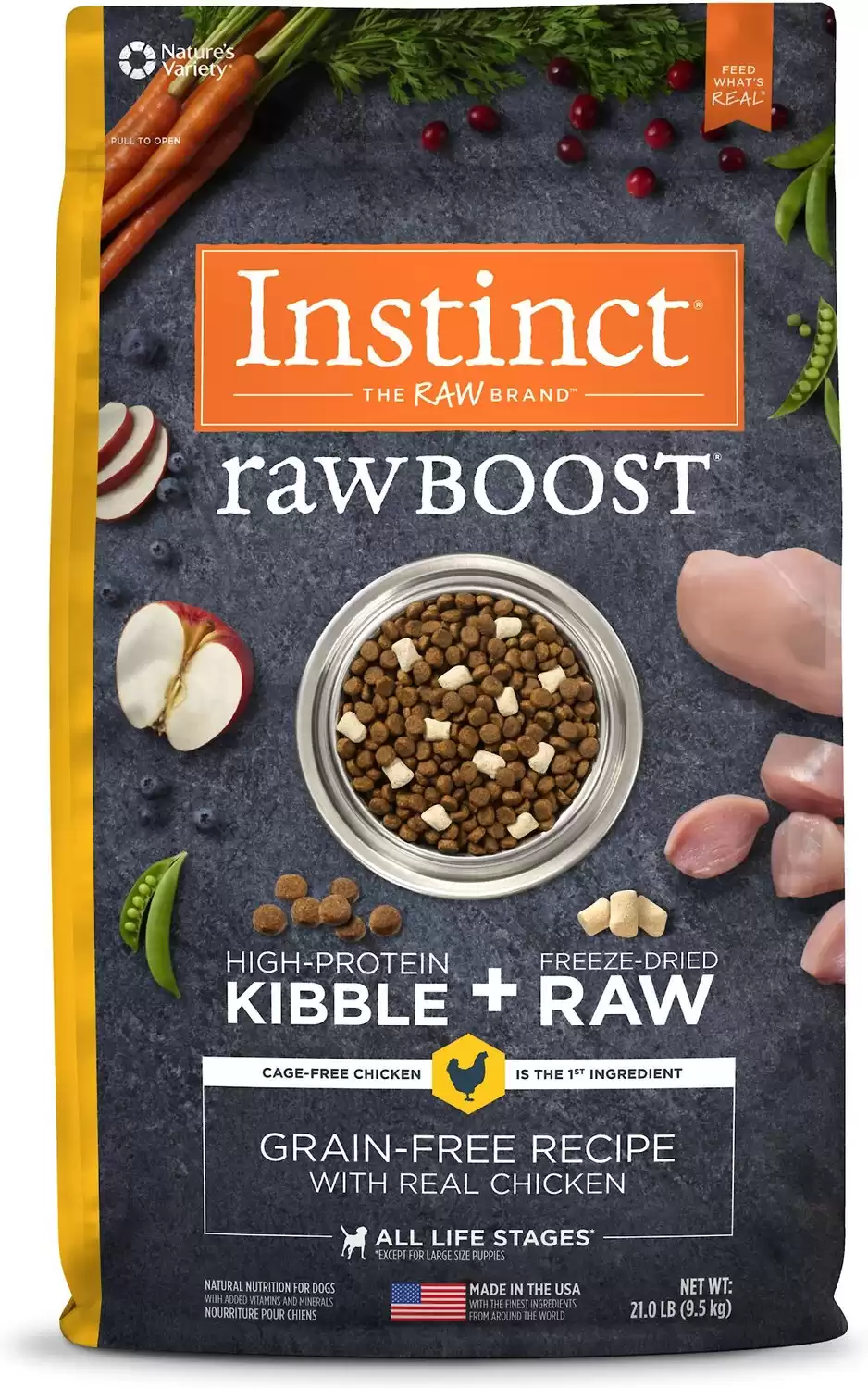Carolina Dog
Canis Lupus
Wild dog breed discovered in the 1970s!
Advertisement
Carolina Dog Scientific Classification
- Kingdom
- Animalia
- Phylum
- Chordata
- Class
- Mammalia
- Order
- Carnivora
- Family
- Canidae
- Genus
- Canis
- Scientific Name
- Canis Lupus
Read our Complete Guide to Classification of Animals.
Carolina Dog Conservation Status
Carolina Dog Facts
Carolina Dog as a Pet:
- General Health
- Energy Level
- Shedability
- Trainability
- Intelligence
- Tendency to Chew
- Size
- Family and kid friendliness
- Yappiness / Barking
- Low
- Separation Anxiety
- Moderate
- Preferred Temperature
- Cold climate
- Exercise Needs
- High
- Friendly With Other Dogs
- Group
- Pure bred cost to own
- $300-$500
- Dog group
- Working
- Male weight
- 30-45 lbs
- Female weight
- 25-35 lbs
This post may contain affiliate links to our partners like Chewy, Amazon, and others. Purchasing through these helps us further the A-Z Animals mission to educate about the world's species.
View all of the Carolina Dog images!
The Carolina Dog is a popular dog to keep as a pet. While wary of strangers, it is incredibly loyal and will form a strong bond quickly.
As strong as the bond may be, they are very reserved and won’t offer much physical attention to show their love.
See all of our expert product reviews.
The quiet, gentle dog can be traced back to Asia where the breed traveled to North America over 9,000 years ago. It slowly migrated to the Southern United States, living in the wilderness for hundreds of years before it was domesticated.
Not only is it a good guard dog, but the Carolina Dog is also strong, quiet, brave, and resourceful. It can adapt to any lifestyle and climatic condition as it has lived in the wilderness for many years.
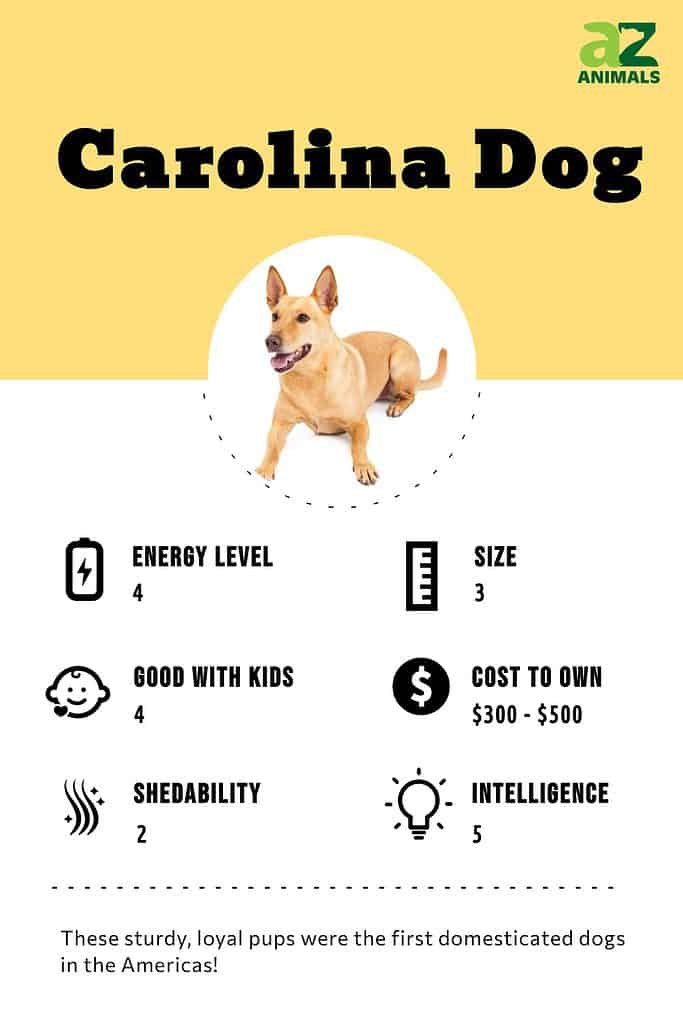
Evolution
Carolina dogs descend from canines who traveled with humans across the Bering land bridge 45,000 – 12,000 years ago. These canine companions were believed to have been bred from domesticated Asian wolves thousands of years earlier. The skeletal remains of these dogs have been found in ceremonial burials in the American Southwest and down into Central and South America. They were prized companions and helpers of Native Americans long before the Europeans arrived. Recent studies of free-range dogs of the Southeast suggest that these “wild” dogs are directly related to the first domesticated dogs from the Paleo period journey. They are called Carolina dogs because packs still roam wild in the Carolinas today.
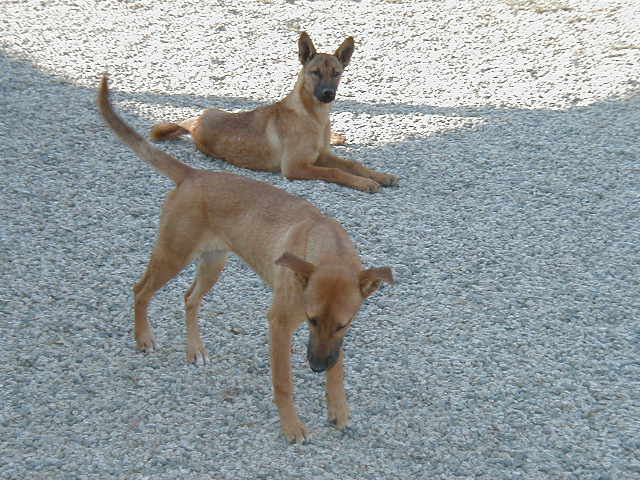
Wild Carolina dogs can still be found in the Carolinas.
©Flaxseedoil, Public domain, via Wikimedia Commons – License
Health and Entertainment for your Carolina Dog
See all of our expert product reviews.
Owning a Carolina Dog: 3 pros and cons
| Pros! | Cons! |
| Easy to groom These dogs clean themselves as cats do, but they require regular grooming sessions and will need their nails trimmed no less than twice monthly. | Needs exercise! This breed was used to running around in the wild, so domestic life needs to include about an hour of exercise every day. Without this exercise, many dogs start to feel restless and cause unnecessary damage to their surroundings. |
| Bonds quickly The Carolina Dog is a pack animal. So, it will easily and quickly form a close bond with family members. | Not friendly with smaller animals Unless socialized early to live with smaller animals like cats, they could attack. After all, they are natural hunters. |
| Quiet The dog will only bark when there is a valid reason. Considering how protective they can be of their family, pet owners that hear this bark can rest assured that they are acting out of this desire. | Not a lap dog! This dog is not overly affectionate. Don’t expect to be licked and smothered all the time, but that doesn’t mean that they aren’t loyal and loving. They just show affection differently, like in the way that they guard their owner. |
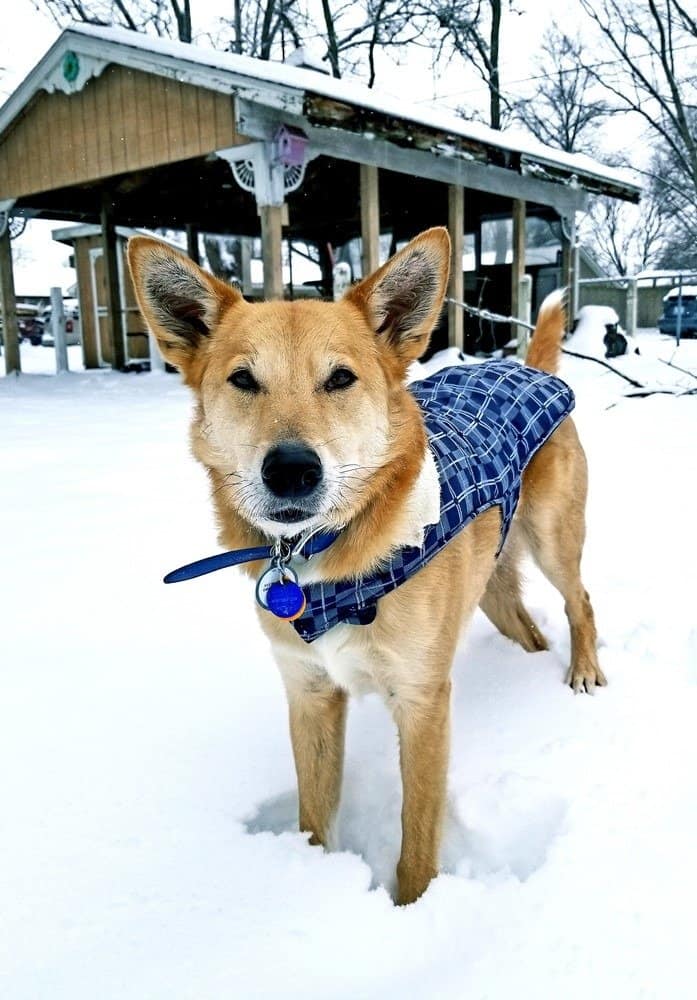
Medium-sized Carolina dogs can adapt to many environments.
©Emily McIntire/Shutterstock.com
Size and Weight
The Carolina dog is of medium size, with an average height of 17-19″ for males and 16-18″ for females. Fully grown males weigh 30-45 lbs. while fully grown females weigh 25-35 lbs.
| Height (male) | 17″-19″ |
| Height (female) | 16″-18″ |
| Weight (male) | 30-45 lbs., fully grown |
| Weight (female) | 25-35 lbs., fully grown |
Common Health issues
Carolina dogs are healthy and could live up to 15 years. Some studies have shown that the breed is sensitive to ivermectin, an ingredient found in medication to treat mites and parasites. Consult a vet before administering it.
The breed is also prone to Hip Dysplasia, a condition that leads to misalignment of the leg bone, hip bone, and hip socket. Most of the time, a dog with hip dysplasia will start favoring their other legs that are less painful to walk on.
The dog could also suffer from Elbow Dysplasia, which is a growth of tissue outside the elbow. This can result in stiffness and discomfort for your dog. Your veterinarian needs to check for this condition during examinations.
In sum, the common health issues with the Carolina Dog are:
- Sensitivity to ivermectin
- Hip Dysplasia
- Elbow Dysplasia
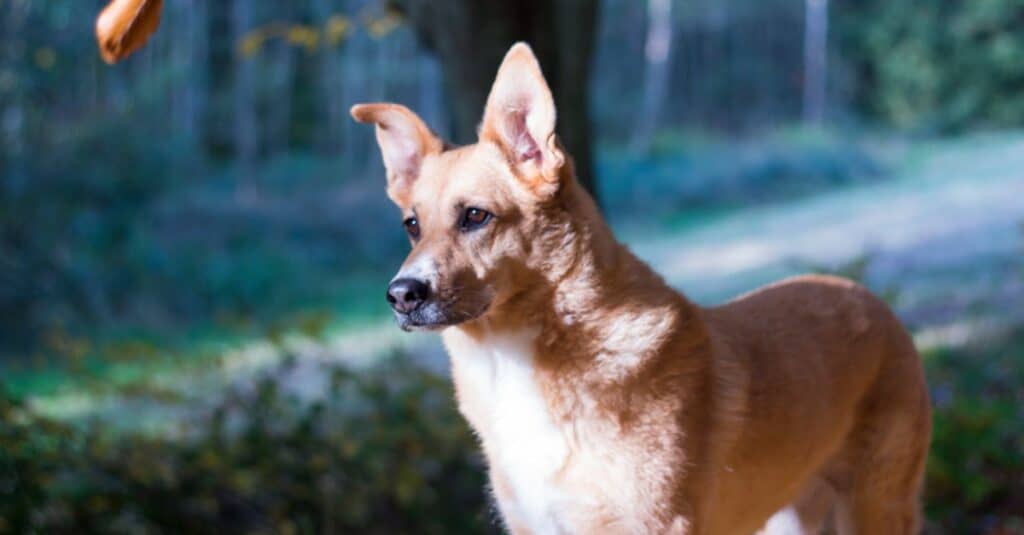
Known as the “yellow dog,” Carolina dogs are friendly and pack-oriented.
©Nachteule/Shutterstock.com
Temperament and Behavior
Carolina dogs have reserved personalities. When they are socialized as puppies, their behavior is friendly and pack-oriented. They are good with other dogs, children, and cats, but their natural desire to hunt means that smaller pets (such as snakes and mice) would not likely be safe around them. Make sure to spend a lot of time with them, as they will exhibit pack behavior; isolation will not suit them well.
The breed is intelligent and eager to please but has a stubborn personality. Offer the dog treats and use positive reinforcement to encourage certain traits. With a little patience, Carolina dogs have the potential to excel in hunting games and competitive activities.
These dogs are gentle and have a quiet demeanor. They can adapt to a lot of environments as long as they have company and get plenty of physical activity and engage in regular exercise. Without it, destructive behavior may ensue.
How to Take Care of Carolina Dog
For anyone who wants to own a Carolina dog, consider a range of factors. Whether it is the sensitivity to certain anti-parasitic medications, consistent grooming, or the abundance of exercise, the Carolina dog has breed-specific needs that will need to be accommodated for a healthy and full life.
The Best Dog Food for Carolina Dogs
Carolina dogs, including puppies, have different health needs from other dogs. For a puppy, the main difference is the amount of protein in the food. A puppy’s food should have more protein than adult food to facilitate its growth. Check the dog food package to ensure that it meets the AAFCO standards of growth.
As for adults, seek out high-quality dog food, whether you prepare it at home with your vet’s approval or if it is commercially manufactured. Dog food should mainly be with meat to provide them with the necessary amino acids.
For both ages, the dog will require fresh water every day. Though some treats are acceptable, overindulgence can lead to obesity.
Some raw, freeze-dried dog foods can pack a bigger protein punch to satisfy your Carolina Dog’s appetite. One excellent choice is Instinct Raw Boost Grain Free Dry Dog Food, High Protein Kibble + Freeze-Dried Raw Dog Food.
This unique high-protein dog food blends the best of both kibble and freeze-dried raw food. When you read the label, you’ll see tons of chicken and fish-derived ingredients for omegas, B12, with no artificial additives, grains, or fillers. Plus, your Carolina Dog’s belly will thank you for the digestion-friendly probiotics.
Follow this link to find Instinct Raw Boost Grain-Free High Protein Kibble-Freeze Dried Food on Chewy or Amazon.
- Grain free chicken kibble + freeze dried raw food
- Provides probiotics, omega 6 fatty acids, and antioxidants for maximum health
- No artificial ingredients
Maintenance and Grooming
Carolina dogs do not require much grooming to remain clean. Just like cats, they regularly clean themselves. However, they will need the occasional bath. No special techniques or tools are needed – simply brushing the dog’s coat and trimming its nails is enough.
The breed generally has a short to medium coat length and is not prone to fur conditions. This dog does not shed much.
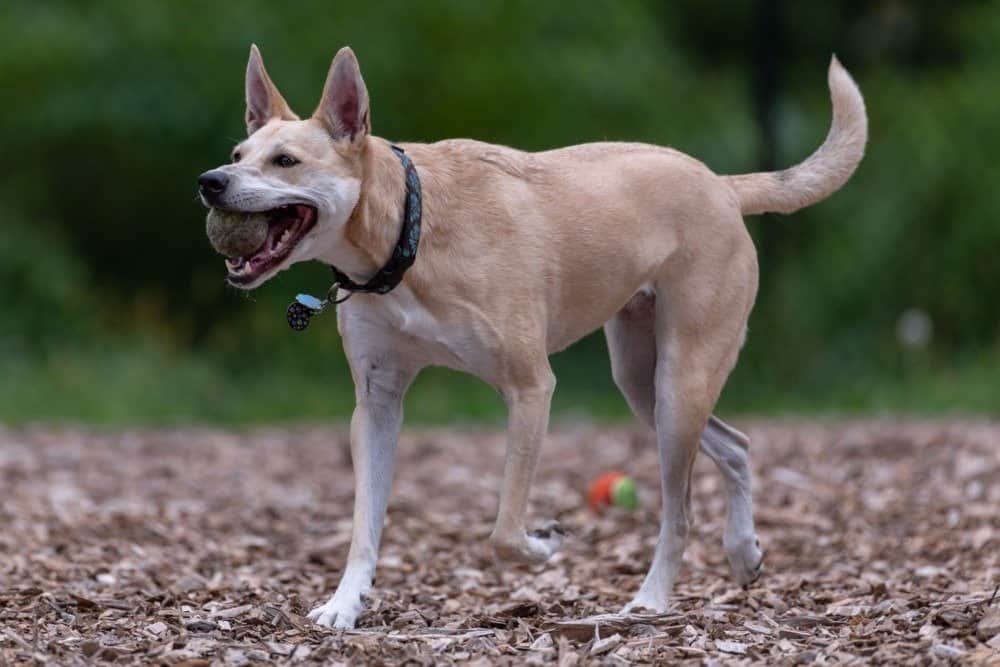
Carolina dogs are eager to please and easy to train.
©Steve McDonald/Shutterstock.com
Training
A Carolina Dog is eager to please so you can easily train it. In comparison with other breeds, these dogs are often stubborn, so following through is where the difficulty lies.
When training them, focus on hunting games and competitive activity because that is what they are naturally good at. Some Carolina Dogs respond to treats, so use them when training.
Exercise
To keep your Carolina Dog healthy, daily exercise is a must. The dog needs a lot of space, so an ideal environment for it would be a fenced backyard or regular walks. Encourage playtime with different activities, such as retrieving flying disks or balls. Outdoor activities such as hiking, and swimming would be a good way for your dog to exercise.
Puppies
Feed a puppy of 3 -6 months three times a day. When they are 6-12 months old, feed them twice a day. After these puppies reach adulthood, one meal is enough.
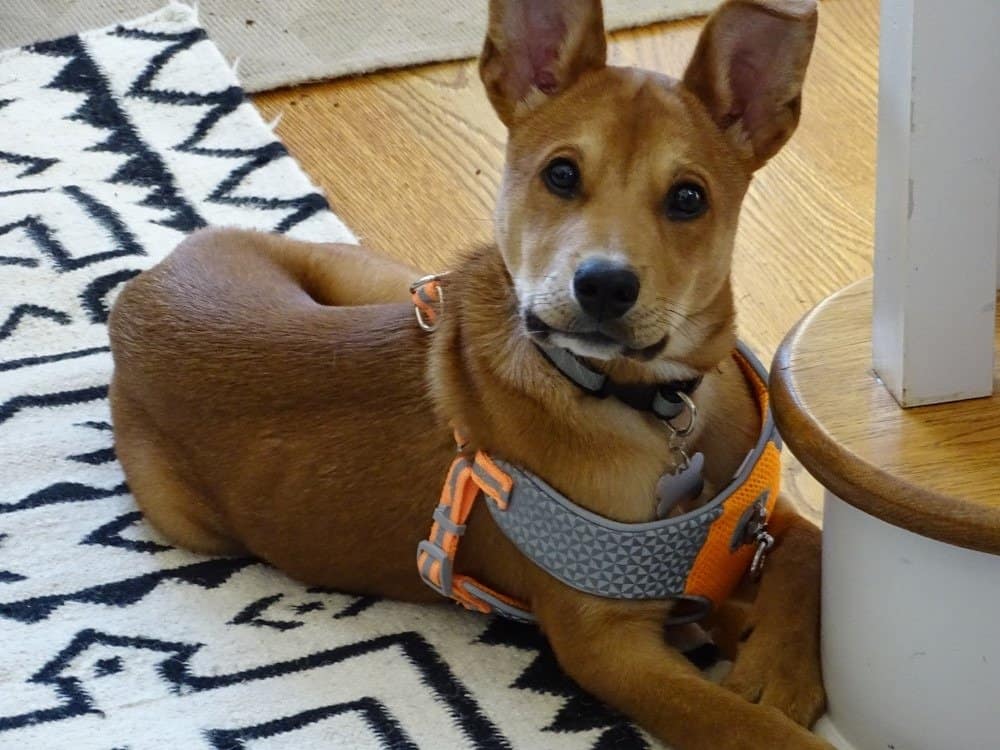
Carolina dogs do well with children and bond with their families easily.
©Mary McDonald/Shutterstock.com
Carolina Dog and Children
This breed of dog is very friendly and good with children. As a pack animal, it is used to company so children might be this dog’s best companions. It also has a lot of energy to spend playing with them.
Dogs similar to Carolina Dog
Other similar dogs to the Carolina Dog are the Basenji, Working Kelpie, and Canaan dogs.
- Basenji: Shares several similarities with the Carolina Dog including grooming themselves, being quiet, and 16-17 inches at the shoulder. They also have short hair and do not require a lot of grooming.
- Working Kelpie: This medium-sized, active dog works a lot. It needs a companion and regular exercise, games, and walks. Much like the Carolina dog, this breed is also very good with children.
- Canaan Dog: This is an excellent guard dog as it is wary of strangers so it will alert you when one is around. They are intelligent, not aggressive, and good with children.
Famous Carolina Dogs
The best-known Carolina dog is Horace, the first modern domesticated dog of this breed. A family found Horace at a dump in South Carolina and brought him home.
Popular Names for Carolina Dog
- Percy
- Ryder
- Jaxson
- Reagan
- Jack
Carolina Dog FAQs (Frequently Asked Questions)
How much does a Carolina dog cost to own?
Most Carolina puppies are priced at $300-$500. Veterinarian costs are $1000+, while professional grooming (including teeth-training) can cost about $250 annually. Treats, toys, and other accessories will vary, based on how often the pet owner purchases them.
Is a Carolina dog good with kids?
Yes, a Carolina dog is friendly and good with children. Since it is energetic, it can play with them too.
How long does a Carolina dog live?
This dog breed lives for 15 years.
Are Carolina dogs good pets?
Yes, Carolina dogs are good pets. However, they need early training and regular exercise to maintain a positive temperament.
Are Carolina dogs dangerous?
No, they are not dangerous. However, they are fairly protective and will need their physical needs met to avoid destructiveness. They get along well with other dogs, children and cats, but could be aggressive with smaller animals.
What is a Carolina dog?
A Carolina Dog is a popular dog breed. It is wary of strangers but can be incredibly loyal once it gets used to you. The dog is relatively quiet and can be traced back to Asia 9,000 years ago. It migrated to South America with merchants, before moving to North America. It would be perfect for you if you have time to play with it or take it for several walks.
Are Carolina Dogs herbivores, carnivores, or omnivores?
Carolina Dogs are Omnivores, meaning they eat both plants and other animals.
What Kingdom do Carolina Dogs belong to?
Carolina Dogs belong to the Kingdom Animalia.
What class do Carolina Dogs belong to?
Carolina Dogs belong to the class Mammalia.
What phylum to Carolina Dogs belong to?
Carolina Dogs belong to the phylum Chordata.
What family do Carolina Dogs belong to?
Carolina Dogs belong to the family Canidae.
What order do Carolina Dogs belong to?
Carolina Dogs belong to the order Carnivora.
What genus do Carolina Dogs belong to?
Carolina Dogs belong to the genus Canis.
What type of covering do Carolina Dogs have?
Carolina Dogs are covered in Hair.
What is an interesting fact about Carolina Dogs?
Carolina Dogs are a wild dog breed discovered in the 1970s!
What is the scientific name for the Carolina Dog?
The scientific name for the Carolina Dog is Canis Lupus.
Thank you for reading! Have some feedback for us? Contact the AZ Animals editorial team.
Sources
- American Kennel Club, Available here: https://www.akc.org/dog-breeds/carolina-dog/
- Dogtime, Available here: https://dogtime.com/dog-breeds/carolina-dog#/slide/1
- Dogzone, Available here: https://www.dogzone.com/breeds/carolina-dog/





